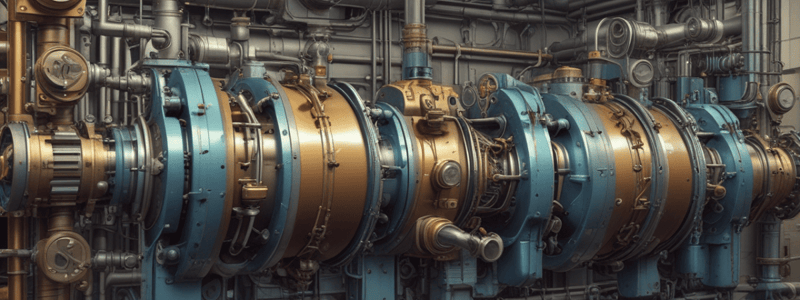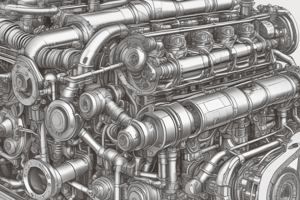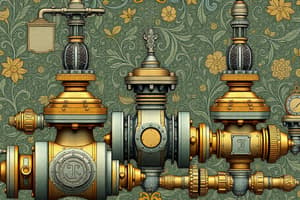Podcast
Questions and Answers
What is the name of the instrument shown in the figure on page 50?
What is the name of the instrument shown in the figure on page 50?
- Solenoid Valve
- Actuator
- Valve Positioner (correct)
- Control Valve
What type of actuator converts pneumatic pressure into mechanical force to move the control valve?
What type of actuator converts pneumatic pressure into mechanical force to move the control valve?
- Electrical Motor Actuator
- Hydraulic Actuator
- Solenoid / Magnetic Actuator
- Pneumatic Actuator (correct)
What is the primary function of the diaphragm in a diaphragm-type actuator?
What is the primary function of the diaphragm in a diaphragm-type actuator?
- To amplify the control signal to the actuator
- To convert air pressure into mechanical force (correct)
- To provide a seal between the actuator and the valve stem
- To regulate the flow of air to the actuator
Which of the following components are involved in positioning the flapper over the nozzle in a pneumatic actuator?
Which of the following components are involved in positioning the flapper over the nozzle in a pneumatic actuator?
In a diaphragm-type actuator, how does the air pressure affect the valve stem?
In a diaphragm-type actuator, how does the air pressure affect the valve stem?
What is the primary function of a valve actuator?
What is the primary function of a valve actuator?
What is the name of the valve type that uses an electric motor as an actuator?
What is the name of the valve type that uses an electric motor as an actuator?
What is the primary purpose of the relay in a pneumatic actuator?
What is the primary purpose of the relay in a pneumatic actuator?
What is the function of the motor in a motor-operated valve?
What is the function of the motor in a motor-operated valve?
What is the purpose of the beam in a pneumatic actuator?
What is the purpose of the beam in a pneumatic actuator?
What type of valve actuator uses electrical energy to attract a magnetic core?
What type of valve actuator uses electrical energy to attract a magnetic core?
What is the role of the stem in a motor-operated valve?
What is the role of the stem in a motor-operated valve?
What is the primary function of the diaphragm in a diaphragm-type actuator?
What is the primary function of the diaphragm in a diaphragm-type actuator?
What is the purpose of the positioner in a pneumatic actuator?
What is the purpose of the positioner in a pneumatic actuator?
What type of actuator uses a motor-driven screw stem to move the valve?
What type of actuator uses a motor-driven screw stem to move the valve?
What is the role of the relay in a pneumatic actuator?
What is the role of the relay in a pneumatic actuator?
The instrument shown on page 50 is a diaphragm-type actuator.
The instrument shown on page 50 is a diaphragm-type actuator.
The part labelled '1' on page 50 is called the 'spring'.
The part labelled '1' on page 50 is called the 'spring'.
The part labelled '3' on page 50 is known as the 'diaphragm'.
The part labelled '3' on page 50 is known as the 'diaphragm'.
The part labelled '5' on page 50 is called the 'stem'.
The part labelled '5' on page 50 is called the 'stem'.
The actuator shown on page 50 requires a pressure of 15 psi to set it to midpoint.
The actuator shown on page 50 requires a pressure of 15 psi to set it to midpoint.
In a diaphragm-type actuator, air pressure pushes the diaphragm up, compressing the spring and pushing the stem down.
In a diaphragm-type actuator, air pressure pushes the diaphragm up, compressing the spring and pushing the stem down.
Solenoid actuators convert electrical energy into mechanical energy.
Solenoid actuators convert electrical energy into mechanical energy.
A motor-operated valve (MOV) is a type of valve that uses a hydraulic actuator.
A motor-operated valve (MOV) is a type of valve that uses a hydraulic actuator.
Flashcards
What is a Valve Actuator?
What is a Valve Actuator?
A device that provides the force to open, close, or adjust a valve.
How Does a Motor-Operated Valve (MOV) Work?
How Does a Motor-Operated Valve (MOV) Work?
An electric motor is used as the actuator to drive a screw stem, which opens or closes the valve.
What are the Main Parts of an MOV?
What are the Main Parts of an MOV?
The main components are the valve itself and a motor-driven screw stem.
What are Pneumatic Actuators?
What are Pneumatic Actuators?
Signup and view all the flashcards
How Does a Pneumatic Actuator Work?
How Does a Pneumatic Actuator Work?
Signup and view all the flashcards
Why do Diaphragm-Type Actuators Use Air Pressure?
Why do Diaphragm-Type Actuators Use Air Pressure?
Signup and view all the flashcards
What is the Role of a Positioner in Pneumatics?
What is the Role of a Positioner in Pneumatics?
Signup and view all the flashcards
How Does a Relay Work with Pneumatic Actuators?
How Does a Relay Work with Pneumatic Actuators?
Signup and view all the flashcards
When are Solenoid/Magnetic Actuators Used?
When are Solenoid/Magnetic Actuators Used?
Signup and view all the flashcards
What is Part 5 of the Solenoid/Magnetic Actuator?
What is Part 5 of the Solenoid/Magnetic Actuator?
Signup and view all the flashcards
What is Part 6 of the Solenoid/Magnetic Actuator?
What is Part 6 of the Solenoid/Magnetic Actuator?
Signup and view all the flashcards
What is Part 7 of the Solenoid/Magnetic Actuator?
What is Part 7 of the Solenoid/Magnetic Actuator?
Signup and view all the flashcards
What Does a Hydraulic Actuator Do?
What Does a Hydraulic Actuator Do?
Signup and view all the flashcards
Why are Hydraulic Actuators Used?
Why are Hydraulic Actuators Used?
Signup and view all the flashcards
What is a Hydraulically Operated Valve (HOV)?
What is a Hydraulically Operated Valve (HOV)?
Signup and view all the flashcards
What are the Applications of Hydraulically Operated Valves (HOVs)?
What are the Applications of Hydraulically Operated Valves (HOVs)?
Signup and view all the flashcards
What is a Solenoid/Magnetic Actuator?
What is a Solenoid/Magnetic Actuator?
Signup and view all the flashcards
How Does a Solenoid/Magnetic Actuator Work?
How Does a Solenoid/Magnetic Actuator Work?
Signup and view all the flashcards
Why are Solenoid/Magnetic Actuators Used?
Why are Solenoid/Magnetic Actuators Used?
Signup and view all the flashcards
Where are Solenoid/Magnetic Actuators Found?
Where are Solenoid/Magnetic Actuators Found?
Signup and view all the flashcards
How Does a Motor Operated Valve (MOV) Use a Motor?
How Does a Motor Operated Valve (MOV) Use a Motor?
Signup and view all the flashcards
Where are Motor Operated Valves (MOV) Used?
Where are Motor Operated Valves (MOV) Used?
Signup and view all the flashcards
What is a Diaphragm in a Pneumatic Actuator?
What is a Diaphragm in a Pneumatic Actuator?
Signup and view all the flashcards
What is the Role of a Diaphragm in a Pneumatic Actuator?
What is the Role of a Diaphragm in a Pneumatic Actuator?
Signup and view all the flashcards
What is a Spring in a Pneumatic Actuator?
What is a Spring in a Pneumatic Actuator?
Signup and view all the flashcards
What is the Role of a Spring in a Pneumatic Actuator?
What is the Role of a Spring in a Pneumatic Actuator?
Signup and view all the flashcards
Study Notes
Valve Actuators
- Valve actuators provide force to open, close, or adjust a valve.
- Four common types of valve actuators in Saudi Aramco:
- Electrical Motor Actuator
- Pneumatic Actuator
- Hydraulic Actuator
- Solenoid / Magnetic Actuator
Motor-Operated Valve (MOV)
- Uses an electric motor as an actuator.
- Consists of two main parts: valve itself and motor-driven screw stem.
- Motor uses two bevelled gears to move the stem up and down.
Pneumatic Actuator
- Converts pneumatic pressure into mechanical force to move the control valve.
- Diaphragm-type actuators use air pressure to overcome friction and process pressure to open and close a valve.
- Normally operates with a positioner.
- Positioner components:
- Beam
- Bellows
- Cam
- Relay uses back pressure created by the flapper and nozzle to send the right amount of air pressure to the actuator.
- Actuator moves the valve stem to open and close the valve.
Instrument Identification
- Instrument shown: Solenoid / Magnetic Actuator
- Parts labelled 1 to 7:
- Part 5: __________________
- Part 6: __________________
- Part 7: __________________
Pneumatic Actuator Operation
- Air pressure forces the diaphragm down, compresses the spring, and pushes the stem down to close the valve.
Valve Actuators
- Valve actuators provide force to open, close, or adjust a valve.
- Four common types of valve actuators in Saudi Aramco:
- Electrical Motor Actuator
- Pneumatic Actuator
- Hydraulic Actuator
- Solenoid / Magnetic Actuator
Motor-Operated Valve (MOV)
- Uses an electric motor as an actuator.
- Consists of two main parts: valve itself and motor-driven screw stem.
- Motor uses two bevelled gears to move the stem up and down.
Pneumatic Actuator
- Converts pneumatic pressure into mechanical force to move the control valve.
- Diaphragm-type actuators use air pressure to overcome friction and process pressure to open and close a valve.
- Normally operates with a positioner.
- Positioner components:
- Beam
- Bellows
- Cam
- Relay uses back pressure created by the flapper and nozzle to send the right amount of air pressure to the actuator.
- Actuator moves the valve stem to open and close the valve.
Instrument Identification
- Instrument shown: Solenoid / Magnetic Actuator
- Parts labelled 1 to 7:
- Part 5: __________________
- Part 6: __________________
- Part 7: __________________
Pneumatic Actuator Operation
- Air pressure forces the diaphragm down, compresses the spring, and pushes the stem down to close the valve.
Valve Actuators
- Valve actuators provide force to open, close, or adjust a valve.
- Four common types of valve actuators in Saudi Aramco:
- Electrical Motor Actuator
- Pneumatic Actuator
- Hydraulic Actuator
- Solenoid / Magnetic Actuator
Motor-Operated Valve (MOV)
- Uses an electric motor as an actuator.
- Consists of two main parts: valve itself and motor-driven screw stem.
- Motor uses two bevelled gears to move the stem up and down.
Pneumatic Actuator
- Converts pneumatic pressure into mechanical force to move the control valve.
- Diaphragm-type actuators use air pressure to overcome friction and process pressure to open and close a valve.
- Normally operates with a positioner.
- Positioner components:
- Beam
- Bellows
- Cam
- Relay uses back pressure created by the flapper and nozzle to send the right amount of air pressure to the actuator.
- Actuator moves the valve stem to open and close the valve.
Instrument Identification
- Instrument shown: Solenoid / Magnetic Actuator
- Parts labelled 1 to 7:
- Part 5: __________________
- Part 6: __________________
- Part 7: __________________
Pneumatic Actuator Operation
- Air pressure forces the diaphragm down, compresses the spring, and pushes the stem down to close the valve.
Studying That Suits You
Use AI to generate personalized quizzes and flashcards to suit your learning preferences.



